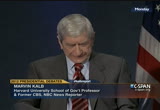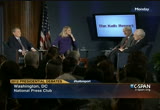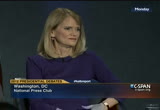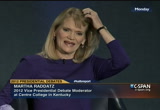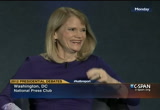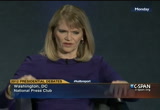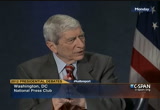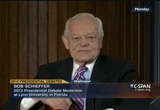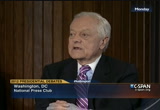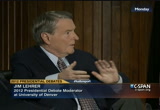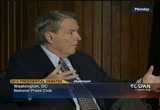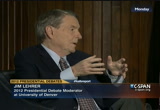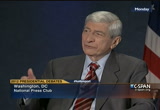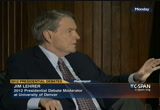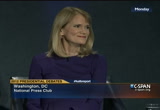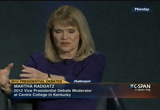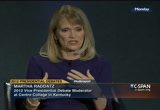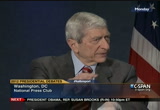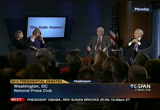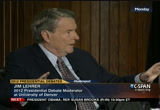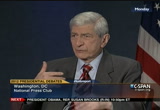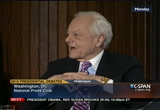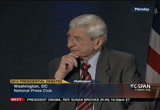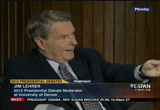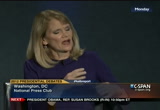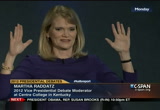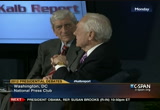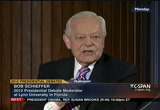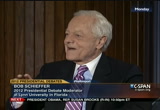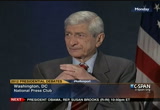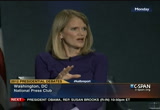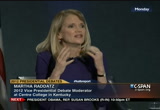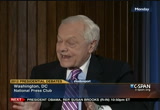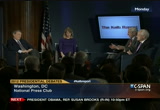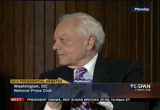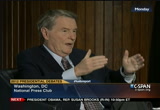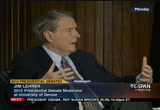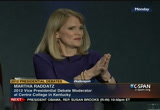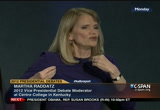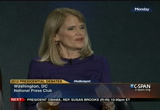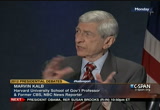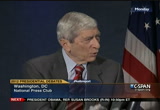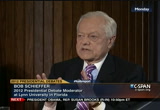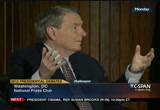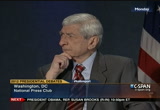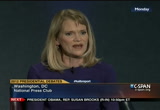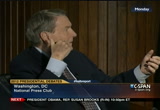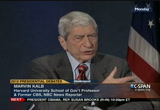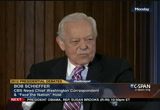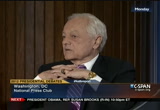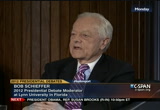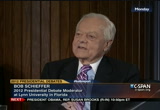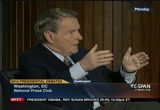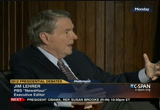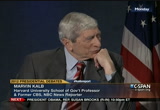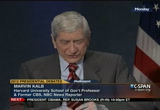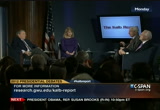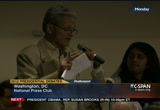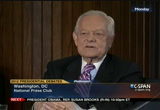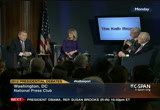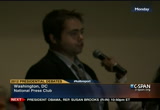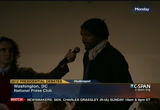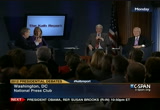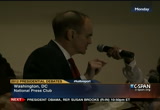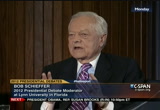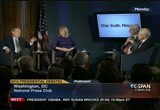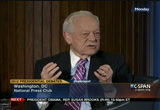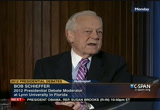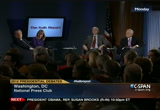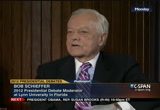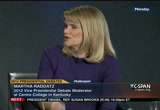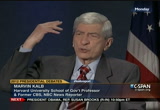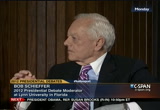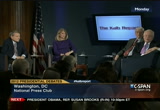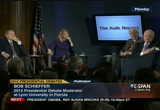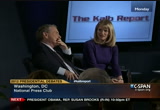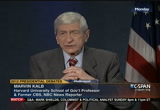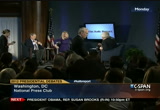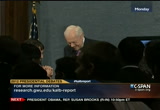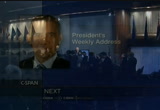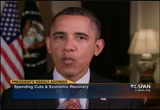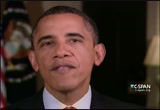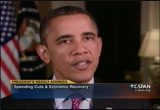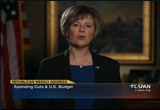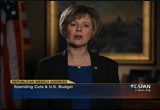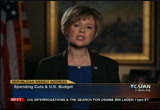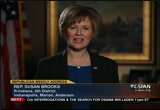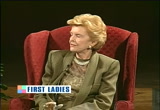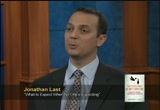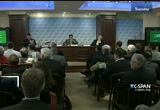tv Presidential Debate Moderators CSPAN February 2, 2013 9:30pm-11:00pm EST
9:30 pm
i am martin kalb. most would agree for the 2012 election being too long, too loud, and too noisy. except for the last month, with three presidential debates and one vice-presidential debate. 70 million watched the first and 60 million watched each of the other three. only the super bowl did better than that. in 11 of the last 14 debates, there have been these debates and they are a fixed feature of the political landscape. we have a wonderful opportunity to talk to three moderatores of the 2012 debate. to my right is jim lehrer, who
9:31 pm
has done 12 debates. nobody will catch up to that. the most honored former anchor and prolific author and winner of every prize in journalism. to my left, bob schieffer, anchor of "face the nation" and an author and winner of many journalism awards, and martha raddatz, the chief global affairs correspondent. she spent a lot of time in iraq and afghanistan and winner of many prizes for her reporting. candy crowley cannot be with us because of a family emergency. we send our best to her.
9:32 pm
jim and bob have done this debate stuff before. for martha, it was a first appearance. you have done so many interviews in your career. was this any different? >> not at all. [applause] [laughter] >> janet brown called me. i said, i'll take a vacation and go do the debates. it was so different. i was not covering the campaign. i was running around the world. i basically crammed and did nothing but study, like studying for the sats, and then taking them in front of millions of people. [laughter]
9:33 pm
when i first got the call, i was so out of the loop, with how they do it that i remember janet saying to me, so how many are there? we would like for you to do the rest of the debate. the fourth vice presidential debate. that is how much that i knew and i told my family, when she called it, it was right after, you have either won the lottery or you have been told you have a terminal illness. >> you did the one vice presidential debate? >> there was only one. >> the gop asked you to refer to congressman paul as mr. ryan, but you did not.
9:34 pm
>> the day before, one of the people at abc got a phone call, from one of his people and said there is disagreement with the commission and we get to be called whatever we want to be called. i am not paying any attention to that. i am driving in kentucky and i get the call, and this is ed gillespie. he says, we have work this out and you will call him mr. ryan. and i said, what about the commission? he said, this is fine with the commission. so you think at the beginning i will say, vice president joe biden, and paul ryan? there was no real agreement.
9:35 pm
>> have either of these political parties ask you to do something other than that. >> that was the only contact i had with anybody and frankly i just put it out of my head. it wasn't i thought -- they ask me to do this. >> and there was no influence -- i never had contact with the campaign and you had the hardest in that you were covering this. i was off in the corner. >> this was not a new experience for you. this time you ask for cbs not to have you report on the other debates because you wanted to avoid even an appearance. so why that attitude of the first time and not the first to? >> what is different is the scrutiny was so intense.
9:36 pm
there used to be about -- 10 people that wrote about these things. and now there are 700, -- >> twitter. [laughter] >> we will get to that. >> just to give you the example. nobody holds back anything anymore. i can remember when people would write letters to the editor, and they would get it out of their system. now they just press the send button. someone showed me the messages that people were tweeting, if that is what you call it, on the night of the debate. one of them said, who is that old guy? is that one of those old guys on the muppets?
9:37 pm
and it was sort of like that. but i kind of understood that in the beginning and i thought it would be a good idea if i stayed under the radar, and waited till my debate came along and to cbs at the beginning, they do pay my salary and they expect some work for that. then they decided maybe this was a good idea. >> was there anything special about this debate? and you were the last one? >> this was a very close election. someone asked me if i was surprised about the outcome, and i was not but this was so close and the blue states were so blue and so red, i would not be surprised if it went the other way. all i knew is that this would be
9:38 pm
very close election. >> jim, you have done 12 of these, i assume that each time you prepared in a similar way, with a very intense preparation. what have you learned, about candidates for the process of presidential debates? what have you picked up? >> there are several things. number one is this is not about the questions, this is about preparation so you can listen, intelligently and make some quick decisions in the new format where you have to react and all of that sort of stuff. it is about spending hours and hours trying to get enough in your head so that can -- if candidate a says something, you know if this is something
9:39 pm
important to say or something they have said before or whatever. and you bring the context with you, and that is the number-one thing. and the other thing is it is never about me. it is never about the moderator. these debates are designed -- i know some moderating in a debate as practiced journalism. the debate is among the candidates and for the candidates and for the public and has nothing to do with the people who are asking the questions and doing the time and all of that. it is a function of the democratic process, that is called the debate. and those are the things that come out of it. >> it is obvious that in 2012,
9:40 pm
we were at new heights of political polarization in the country itself and i wonder, why do you think, and i will turn to you first, why was the so much criticism of the moderator's this time, which had not been the case in earlier debates? >> i did. most of this dissipated over time because the initial criticism was that it came from partisans who thought that barack obama did a very poor job and those people could not criticize obama so they had to criticize somebody and had to criticize me or the process but
9:41 pm
once they realized it did not have that much to do with whether obama did well or mitt romney did well and had more to do with the two of them, that kind of went away, but the intensity of it was because there was this dramatic difference, with what happened? the moderator did not do this -- i now like to be criticized, it's not one of my favorite things to be but -- as i said, it dissipated and is gone, and most of the people who did the criticizing, many of them have come to me afterward and said, i am sorry. >> you said of the moderator should be seen little and heard even less, and in use of the moderator should stay out of the way of the flow. that being a very valid point of view, why not challenge a candidate who, you are listening to someone hide something beyond reality or live or simply-- hype
9:42 pm
something beyond reality or lie of simply mislead the public? why not take that among yourself? >> i would if those were the only events in the course of a presidential election. by the time you get to october, we got to october 2012, the campaign had been going on two years. >> seems longer. [laughter] >> this is a lot of the process but this is not all of the process. if the candidate who says something and it is the responsibility of the first candidate to challenge --
9:43 pm
>> you do not feel that it is your job as a moderator to be part of this. >> for me to facilitate, to do something about it, yes. but not for me to do it. >> when you were doing your debate, the vice presidential debate, you appear to have a different point of view because i remind you, your first question about libya was rather sharp, this was a pointed question. >> no forgiveness for saying i t.
9:44 pm
>> you were clearly not just setting this up, and a sitting back, you were part of this. i am trying to understand if we are witnessing two philosophies in journalism at work. i have a feeling bob may agree with jim on this -- but i have this impression from you, anyway, that you had a somewhat different approach. >> i worship these guys and they are fantastic. i read jim's book and -- that was part of my homework. but we all bring a different style and to me, i was chosen because i was a journalist. i did not believe i could lead to someone's defense and lead to the others defense but if i ask a question i want an answer.
9:45 pm
this is my style. i went through this thing when i was first chosen, thinking, i am not george stephanopoulos, but i was chosen for who i am and i was chosen for whatever body of work and have that i am proud of and i felt that -- the only thing i would say is different, i spent a lot of time on the questions. i crammed my head as much as i could and remembered things, but to me, i did what pointed questions and i wanted answers. we all have interviewed public figures and usually get 20 minutes and 18 minutes and you don't want to hound them over one topical item -- you cannot help but be part of this. you are looked at because of the questions you ask and what you contribute in the wake of that
9:46 pm
debate. >> there is another question having to do with the moderator's, and that was this business of, the political party is getting an answer to the question, what is the sistine mets going to be devoted to? devoted to economics or foreign policy, iraq and iran, what ever it should be. at cbs we made a deal about never giving you the questions or categories, because you are supposed to keep that distance. >> do you feel any sense of discomfort at having to participate in what you did this time. >> this is the first time i have that this way and this was new, and basically -- janet called me
9:47 pm
and said, this time we want to divide this up into six categories, and i said, fine. you did not have to say in what order were anything but i think you really don't need to in today's sophisticated world. >> but you did. and this hadn't happened before so why was the change. >> with the commission said to me was that they were keen on two things. and the commission is running this. the three of us and candy are not rolling this. >> by your jim lehrer. >> -- you are jim lehrer. >> this is how they ask and here
9:48 pm
is how the imitation goes to the debate. and if under these rules, would you do this certain fang -- i found out what they propose and made the decision, i would do that and here is what they said. because i was like that as well. the feeling was that the commission wanted to make sure that in the mind of the public this was a debate between the candidates, that this was not a gotcha game. this is not about reporters trying to embarrass people asked him who the prime minister of whatever this. let's open this thing up in the new 24-7 world, let's make these debates different from everything else. >> and this is to inform, in the hand, and you want the american public to know who these people are and i actually think -- let's face it, there are not that many surprise categories.
9:49 pm
>> if they have said, we have to see the list of categories and we will decide which ones that you can use and you can't, that would be a different story. >> i would remind you that three of mind -- six of mine, three of them were the economy. and that really stunned everybody. >> and even getting into this, this is the experience of the league of women voters, they sponsored the debate in 1976 and 1984 and for the sake of transparency i was one of the reporters that ask questions in 1984. when we finished with that, they pulled out of the sponsorship and argued at the time that
9:50 pm
there was too much party interference and they said that they had no intention of becoming an accessory to the hoodwinking of the american public. i think that this is terribly tough language, but my question this is overstated. >> but my question to you is not as moderators but as reporters. is this something where there may be the beginning of too cozy a relationship between the parties, and the public? >> i really don't -- i did a foreign policy debate and two of my sections were the middle east. are you going to talk about foreign policy without talking about the middle east? >> it is so obvious, why do this?
9:51 pm
>> if they don't want to do this, this is fine with me. >> one thing you want to remember is these debates are about substance, and they are about the middle east and the economy, but what they are really about are the candidates, and who these two people are. do you like them, do you have a feeling of trust? you take the measure of these individuals, and you ask them about anything, and the debate would still have a value. at that stage of the game in october, most of the people who are interested have already been falling the campaign and know the differences about issues. >> and we could have asked about anything, even as an economic question and get anything that you want.
9:52 pm
>> we spend a lot of time talking about education in the foreign policy debate. >> when you were there in the middle of the first debate, the one that the president was said to have them poor, as this was happening, was that your impression? >> no. >> what was your impression? >> the impressions that are going on, i considered more than one thing at a time, and i believed that romney was doing better and i thought that he was doing well. my own rule is that mitt romney is talking, and obama is standing here, i only look at mitt romney and i never look at the other candidate. i don't want to be a party to his reaction. the consequence is that when mitt romney was talking i did not know, even though i was closer to him than anybody, i was not watching the reactions
9:53 pm
of barack obama. the only time i looked at him as when he was talking. i cannot help but notice a couple of times he did not look at me, i did not have the impression. >> in the vice-presidential debate, did you see or hear anything that we, as television viewers of the debate may have missed? >> it is one thing from jim's book, you may miss the moment, on television. i don't think -- i think the one impression, for the same reason, i had no idea that all ryan was
9:54 pm
753 glasses of water. this was like a saturday night live skit. i thought, i am so thirsty. these guys are talking and they have had no water. i do not think that i missed this. one thing that happens in the debates is the candidates come in, and they are ready for what ever debate that they are ready for. i think that joe biden thought that this would be a little bit more contentious. it took him awhile to get adjusted to that. i thought that this was a very interesting thing, to realize that. that this was happening with the candidates.
9:55 pm
what would you get to see those rehearsals? >> now that i have thought about this at this very moment, i don't think obama was prepared for what romney was doing. i was not -- >> having done this three times, you cover all the people that you interview in these presidential debates, what do you pick up, and what are the ingredients of political success? your interviews with people who have risen to the very top, what is it about them? >> every debate is different. you talk about the things that were missed in the 2008 debate, which i moderated between president obama and john mccain, these are two very different
9:56 pm
people and personalities and when obama would speak, john mccain would furiously taking notes. he is always over calf and it anyway. i love the guy and i like him, but he would take all of these notes and when you look over at obama, when mccain was speaking, obama never took a note. he tried to maintain absolute, direct eye contact, with john mccain almost as if, you will not rattle my chain. and he just keep looking at him and the only time -- during the debate, i still, do not know why he did this, he picked up his pen and he would draw a straight line across the notebook. if this was some sort of as an exercise or maybe he was putting
9:57 pm
400 pounds of weight on this or whenever he was doing -- he always did that and i've never had the opportunity to ask why he did that. during the primary debates with romney, and i talk to him about this, he always wrote something down at the top of this note but -- notebook and i asked him, what do you write down there? he said, i write down, dad, and it reminds me of my father, and he is my hero. he says i just think of him and this helps me. i have to admit that during this presidential debates i looked down, he wrote something down but i was never able to look
9:58 pm
over far enough to see if he was writing down his dad's name. >> i want to remind our audience, that this is "the kalb report" and my guests are jim leher, martha raddatz and bob schiefer. a question, you believe that these debates make our democracy better? we are focused on the role of presidential debates. do these debates make our democracy, as we would like to think of it, does it make it better? >> 100 percent, yes, without reservation. because they are the only times in the course of a presidential campaign when the candidates on the same stage at the same time
9:59 pm
talking about the same things in a comparative way for everyone who will vote in that election, can see them in action and whenever they are doing, what ever they are talking about, that is the only time they can do that and anytime that you can do that is a good step in the democratic process. >> you will not agree with that? >> i think it is better for democracy and a terrific experience for the american public. and it is kind of a coming together. i now believe in the got you, either. i would never come in there with a gotcha question. you have this sense that you are doing something very important. like you've never done before, that this matters and you are a voice in helping the public
10:00 pm
understand, that your help in the democratic process, those debates help the democratic process. >> what is your proof? i will ask you got to question. >> 65 million americans watched, and 65 million americans learn something and they are debating the debates the next day. they are not tune in to reporters to hear, they're not listening to what they want to hear, they're not hearing people wanting to get on the news that night, and people asking these questions. >> let me give you the proof, the debates on the last political event that we have for you can get people from both sides to listen to you, at the same time and watch at the same
10:01 pm
time, and all that you have to do is look at the television ratings, and the breakdown of the democrats and republicans -- republicans watched the republican convention, democrats watched the democratic convention, and the washington of today is not the same as in 1969, the democrats and republicans don't like to be in the same rooms and they don't like the folks back home to think that they are consorting with the enemy but they will sit through listening to barack obama so they can hear what mitt romney has to say and democrats will do the same. and this is the last event where you can say this. this is a good thing. the evidence is that political polarization is worse at this time that has been forever and a day.
10:02 pm
>> political polarization is because of a lot of different things, but one of the reasons that we have this is because we don't all get the same stuff anymore. you can get the news delivered to you from any point of view you want. if you want a conservative point of view, democratic, a liberal point of view, vegetarian view, you can find it, and the result is that people at one end of the spectrum simply are not always getting the full story. >> i have to point out, there are many scholars in this country who have done studies of the impact of the presidential debate on their luck -- the election itself and many of them have said that these debates are grand and wonderful things, but at the end of the day they don't mean all that much to the voters.
10:03 pm
by the time of these debates, -- people have more or less made up their minds and it is much more like in 1992, it is issues that affect individuals who are going in to both that this wonderful and informative television debate. >> there is no question that the economy is what the elections are about. but i would point out to the scholars that there were two shifts in public opinion during this campaign. the first one came after the first debate. when suddenly, here came romney and people said, that look like obama was going to run away with it, and the second change came
10:04 pm
at the end of the democratic convention, after the speech by bill clinton. these chefs do change minds and i think fat they are one of the best parts of the campaign process and i think that we need to have more debates. >> but let me say to the scholars, they overlook the obvious and maybe that is why they are scholars. [laughter] no, that is applied -- that is not a put down. scholars need to go beyond the obvious. that is what makes them scholars. what is obvious is that 64 million people watched the first debate. four years ago was about the
10:05 pm
same number and there was no two-one change like there was in 2012 of what the debates too, they are confirming exercises. and the scholars tend to say, they did not change any votes and as a consequence the debates did not matter. people watch those debates, all the democrats and republicans watch, and if you are a republican you are watching your candidate in your already leaning that way. i liked this guy, and i am taking the measure, and there is a small percentage of people who are legitimately undecided. but the debate is for everyone. and what this does is rally the supporters as much as it does, as much as it causes people to change their minds or make a decision, and to me, that is hugely important.
10:06 pm
>> in these debates, as a participant -- who has the advantage, the incumbent or the challenger? the incumbent because he can excel -- he can speak with greater authority, or the challenger, because he does not have a greater authority? >> it depends on who the incumbent is, and the non- incumbent. i know that -- going into my debate there was being written, about how paul ryan must be -- he must be studying up on foreign policy. but on the other end, people wrote that joe biden was more nervous because he did not know a fair bit about. -- foreign policy. with the incumbent maybe you have to go over a higher bar, and as the non-incumbent you
10:07 pm
just have to prove yourself. >> was there any question you could come up with, was the one that you could have passed either one of the candidates that may have put them off stride for a moment? >> all three of us think -- i wish i had asked this, or that way, but it, i did not try to do that, i just wanted to know what they knew. and there is this line that you don't want to look like a complete jerk. you don't want to ask that
10:08 pm
question in a way that makes you look like it is just too cute, or were you trying to throw them off, let's go back to bernie shaw. i was out there as a somewhat young reporter, a local tv reporter and i remember hearing that in los angeles, and it was stunning. in the end, talk about a debate that changes things. >> the s, if this wife was raped would he believe in the death penalty. and i love that -- michael dukakis said, he was over brief that he had his answer is there and he did not think about it. there is just the moment where the moderator my ask, there is the over-briefing. one of the debates with the cheney and joseph lieberman, lieberman has staring directly in the camera the whole time, he seemed to weigh more brief.
10:09 pm
>> bernie shaw has the view that if he has the opportunity to talk to someone who may be president of the united states, or who is, it is not special that this is a presidential debate. if you have the opportunity to ask a question about a major issue, take the opportunity because most of the time, in his view, the politician will use you and your network to sell his point of view and himself. if you have the opportunity to do your thing and ask the tough questions, that is the bernie shaw line. we learned in 1960 that kennedy arrived tan, rested, ready, and nixon was pale, 5 o'clock shadow, restless.
10:10 pm
at that time, studies suggested that kennedy won the debate on television but nixon won on radio. he came across as authoritative. you guys have been at this. what is important in our world of television that is so critical? what is the key thing? a wonderful, clear policy presentation or wearing the kind of socks you are today. really lovely socks. what grabs you like mondale in 1984, where's the beef? senator, you are no jack kennedy. the line or the more structured presentation.
10:11 pm
>> people vote for president. this is a different vote from anything you have to cast. if you vote for councilman, you vote for issues. will he keep 7-11 up on sundays? will he zone your neighborhood to keep out mini-warehouses. but the vote for president is different and most studies suggest people vote for the person they have the most confidence in in a time of national crisis.
10:12 pm
i happen to think this is a good reason. in that case, communication skills do matter. the american people are not stupid. they are generally pretty smart. they pick the right candidates. you get a fuller picture of the person running for president, not just the talking points but you get to see him react and how he reacts when the pressure is on. >> or she. >> or she, next time around. >> the ability to communicate is critical. you can have the greatest ideas in the world but if you can't communicate them, forget it. >> that is about leadership. it is not just a performance in a debate, it is leadership. >> i want to test you on a different narrative.
10:13 pm
there were 10 million tweets in the first debate. the most ever in american politics. if this was important to you as a moderator. if it was important, or if this fact alone has any importance at all, please explain it to me. i want to stop with martha.-- start with martha. >> twitter -- it is out there. there are voices out there with influence. we as journalists -- it is a great journalistic tool. >> how did it effect you as a moderator? >> i had some strange press the day before, for 15 minutes, rattled me. i will tell you. it effected me as a mom. my son is on twitter all the time. if he is in the bedroom, "are you coming to dinner."
10:14 pm
but there was such nasty stuff. >> directed at you? >> but my son said, "mom, there are crazy people who write mean things." he's a football player. he said, "they have three followers." they all live in basements with 75 cats. what i want to do is a reality where i find those people and say, "what do you mean, you don't like my hair? yours isn't great either." >> do these bother you? >> i got millions of critical tweets, i understand. i didn't read them. >> you're a better person than i
10:15 pm
am. >> it -- quick story. when that debate was over, we went to dinner, kate and our kids and i came away from the denver hall to the hotel where we're having dinner, we talked about the debate and that stuff. we were just talking about the debate. it wasn't that obama had done poorly or that i was a fool. then one of the people at the table had one of these gadgets. >> like a twitter gadget. >> one of our friends -- they are tweeting this.
10:16 pm
>> they are saying all kinds of things. some of the stuff, you don't want to know. that was the end of it. then i heard about these millions of tweets and knew some were critical. the bottom line, i felt good about that debate. no tweet and twitter, ten million twitters and tweets -- >> hashtag bobs purple socks. let's see how many we can get. >> relating to the new technology. we are caught right now in twin revolutions with politics and jouranlism and one -- journalism and one effects the other. your sense as a long-time political observer, with the impact of the new technology on the politics.
10:17 pm
>> it turned everything upside down. when i was a young reporter for the "fort worth star telegram." about 10 days out, there would be a whispering campaign that one of the candidates had a girlfriend on the east side. all the girlfriends live on the east side. as a reporter, we'd go check it out. if it amounted to anything we may do something. i can't remember if it ever amounted to anything. now, there are no whispering campaigns. if someone has a rumor, someone write sit on a blog and it is out there. we as journalists, we treat them as news tips. we'd never broadcast it unless it was true. not everyone follows the standards of mainstream
10:18 pm
journalism. the politicians have to decide to i ignore this and hope it goes away. there is an old financial recourse. if i make a mistake and libel somebody, cbs has deep pockets. you will sue this guy in the basement with the cat? there is nothing you can do about it. we are trying to come to grips and handle it. it has changed everything with how politics operate. >> let's look ahead to 2016, and look to the future for a moment. both of you said earlier you'd prefer there be more debates rather than fewer.
10:19 pm
do you think in this age of social media, where the patience of the american people is measured by the length of a tweet is limited. do you think they'd be able to tolerate more 90-minute discussions of serious issues? >> we get 60 million to watch them. maybe they would. what i want to see is six debates with the first coming immediately after the last political convention. if the democrats are last, next week, have the debate, if the republicans are last, next week, have the debate. i think they can set the tone. if you can have that first debate as quickly as possible it could change the tone of the debate itself. at least it would get it off to a serious start. i would also say -- since you asked me, i think the right format is to have the two candidates seated at a table with the moderator. that seems to work.
10:20 pm
the last two, that is the format. i think you can exercise better control instead of standing behind a podium. if the debate commission asked me. they don't have to ask me, i'll tell them. i would suggest to do away with the town hall forum. it does not work in my view, with too much show business into it.
10:21 pm
you get the candidates performing and walking over and getting in the other guy's face. >> it shows something about the candidates. i would say -- i like the four debates. i was done with those debates. you talked it up perfectly. >> the idea, jim, of doing a debate -- if we do more debates, if that idea is seriously considered, what about doing that 90 minutes on one subject? >> that is why i'd want to do six. you can -- have one subject for the whole 90 minutes, and do it by subject rather than format. and what people think about the town halls, my experience, the moderator chooses the question. you'll get 22 questions, there is no give and take.
10:22 pm
it's not a real town hall. but it does have some appeal. in terms of the subject, it is not the place -- the town hall meeting is a different kind of thing. but if you did one subject at a time, i think the evidence is out there and the public would watch this. 67 million people sat at the television and watched those debates. another 16 or 20 people,there were 100 million people watching some or all of the first debate, and the same numbers continued through them all. >> we have a little more than a minute to go. i want to ask -- martha, why do you think they asked you to do a debate? >> i don't know.
10:23 pm
maybe because i wasn't covering the campaign? i was covering the whitehouse and i -- that wasn't my favorite assignment. >> if they asked you in 2016? >> it is an honor. i hope i was chosen for my body of work and am a reporter that people trust. >> why, aside from the color of your socks, do you think the commission came to you a third time? >> i work cheap. [laughter] i have no idea. maybe because i'm older.
10:24 pm
>> would you do it again? >> no, i think i've served my time here. i'll quit while i'm ahead. >> jim, i asked you this question. you said, no on 2012, and you did it. in 10 seconds, can you say while you'll say yes again in 2016? >> the answer is no. i won't do it in 2016. >> friends and colleagues, our time is up. the tyranny of the clock again. you are familiar with the tyranny of the clock. but i want to close with an editorial point. i think these debates are essential to the democratic process.
10:25 pm
as far as i'm concerned, a pat on the back to the committee on presidential debates. i want to extend my thanks to a wonderful audience. a great panel of moderators and all of you who treasure a free and vibrant press as the greatest guarantuer of a free society. as edwar r. murrow would say, "good night and good luck." [applause] >> ladies and gentlemen, what we do now, there are microphones back there and over here, and if you have a question, go to the microphone and i will recognize you, and it will be for a question. and if you start making a speech, i will cut you off. so don't make me be a mean guy.
10:26 pm
you can address it to the person you'd like an answer from. let's start on the right. >> give us your name -- >> my name is joseph burry, i am an alumnus of the graduate school of business. you had a great remark and a great question. do these debates promote democracy? the people up there are major party candidates. >> not a two-part question.
10:27 pm
>> please ask it. >> my question is, other than mr. leher, who i commend, the other three did not follow the rules, which were simple. they were to be given one minute a piece, one minute for the question, two for response, two for the re-response. and -- >> i hear you. thank you very much. would someone on the platform answer? >> i think we did follow the rules. these were 15-minute segments. you had a response and a discussion. >> those were not the rules. >> that is another debate. >> i don't want to get into a debate here. >> i'd like to ask a question
10:28 pm
about an issue that played a role but was never discussed, climate change. they expect reporters to ask about the future -- >> let me say one quick thing. i arrange my things by subject and what is most important. i was cut from the bottom to see how the discussions ran. climate change was on the list and i didn't get to it. one of my huge frustrations, small potatoes frustration.
10:29 pm
i thought the debate itself was fine but it was limiting in the subjects that could be covered. i made the decision, sitting there. we had to cut, and i cut that. it was limiting in the terms of the number of subjects that could have been covered. i made the decision sitting there that we had to cut that. immigration and other things did not get in there, either. >> the fiscal cliff, was it part of the issue you did not get to, also? >> it came up. i decided we said enough about it. >> ok. out there, please. >> investigative journalist. i wanted to ask specifically to ms. raddatz. the fact that the president attended your wedding. do you think that was handled right and given a second chance, would you have done it differently?
10:30 pm
>> i did nothing. i did not have to handle that. i will not comment about that. that was something that had happened two days before the debate. it had been in "the new york times" before that. i had to put that out of my head. that had nothing to do with what i did at the debate. nothing. >> thank you. yes, please? >> my name is steve. i work in the news business. to the extent you are familiar, so some anecdotes about planned stage management about some of these debates and keeping people on time with their cues and not veering too far off the questions. thanks. >> keeping on cue. i will tell you a quick anecdote.
10:31 pm
my first debate in 1988, george h. w. bush vs. michael dukakis. george h. w. bush was the vice president and he gave an answer. high-tech, green light, yellow light, red light, and green light said you could talk, yellow lights that you could line up, red light said shut up. george h. w. bush in the middle of an answer, i stopped him and said, mr. vice president, your time is up. he pointed to the lights and said, i have still got some time. in my ear, i heard the voice of the executive producer saying, jim, he is right. [laughter] in front of everybody i have ever known in my whole life -- [laughter] i said, i am sorry, you are right, go ahead. he looked at me and said, i forgot what i was going to say. [laughter]
10:32 pm
i wanted the biggest hole in the world to drop in and never be seen again. [laughter] i still do not know what happened. i do not know how i got it wrong. >> beautiful. yes, please. >> would gingrich have won in south carolina if he repeated his performance in florida instead of falling asleep? would he have one to go to the primary debates? likewise, would obama have lost the election after the polls slip and showed romney was ahead. would he have repeated that performance in the next two debates?
10:33 pm
does that make the case that style is more important, sound bites are more important than substance? what is your reaction to that? >> these are questions we will never know the answer to. i think where governor romney made a mistake, i think, this is my sense of it and the way he reacted to the questions i asked, i think governor romney thought he was a hit going into the third debate. the nominees polls had suggested that. but based on some reporting, i believe he thought he was a hit when he went into that debate. he went into what a football team does when they are a hit in a game. he went into a prevent defense. that probably hurt him. i do not think at that time he was ahead.
10:34 pm
one of the things i base this on, i started out that debate asking him a pretty pointed question about benghazi. republicans were really criticizing the president for this. this was a place where if governor romney really wanted to take on the president, he could have done it. he just sort of skipped by that question and went on to something else. i think he was afraid he did not want to appear overly aggressive and i think that was probably a mistake on his part. >> the reverse was true. obama for the first debate. he thought he was a hit and thought he could coast and he paid a price for it. >> yes, please.
10:35 pm
>> i am a washington d.c. resident. my question is for mr. schieffer. considering what you discussed about how most americans are watching news that is tailored to their political views and candidates are going on those news shows, this is one of the only opportunities for those 60 million americans to see a candidate willing to challenge them. do you think that changes the role the moderator plays in the debates? >> i was not one who said i did not approach this as a journalist. i do. i do think this is a place where you are there to give these candidates a chance pass and an opportunity to show who they are.
10:36 pm
like jim, i do believe when one can do it says something, it is the responsibility of the other candidate that if there is an inaccurate see there, if there is a different point of view there, i think the other candidates should have the first opportunity to make that correction. >> what about the second opportunity? >> i tried at times when i thought it was not being addressed to address that. i think you are trying to find out who these people are. and what they are about. and what they would do if they are confronted with these situations that are going to come up in the presidency. like jim, you are not electing a moderator. you are electing a president. everybody who moderates one of these debates has to keep that in mind. to your point, you are absolutely right. we are not all getting the same stuff anymore. the only way you can be truly informed is to consult a variety of sources before you make up your own mind.
10:37 pm
>> let me add a little bit what i said. you are obviously functioning as a journalist. not in a way i would be if i were doing something on the news hour or bob was doing on cbs, or martha on abc. it is a different form with a different purpose. yes, the skills involved that i use and we used, whoever does, our basic journalism skills, you have to know what the hell is going on. you have to know how to question and listen, those are journalism skills. i did not say that very well so thank you for the opportunity to correct myself. [laughter] >> yes, please. >> i am an engineering student. one of the things i love about the debates is they serve to detach the candidates from these big campaign machines and let you see them for who they are as people. where is the line between gotcha questions and questions that do not hit the point in terms of getting the candidates to be real humans?
10:38 pm
>> you are trying to get people to say things they mean, not what they did not mean. that is why i do not think some gotcha thing works. there are a lot of things. if somebody asked me who the president of some country, there are a whole lot of countries, i would not know the answer. i do not think that would have anything to do with whether i am an informed person. it is just not my specialty or something. i think that is where the line is carried you are trying to get people to say who they are and what they mean and why they have taken the positions they have taken, not to mix them up.
10:39 pm
you will find out soon enough if they know what they are talking about and more than two paragraphs. >> one of the things you are trying to do is be fair. and let them talk about what they want to talk about. i think the difference between intervening is if i ask a question and i want an answer to that question, yes i agree if they do not answer my question i might try to press it, but if someone else is challenging them on accuracy from the way they see it, that is very different. there is a point of view sometimes when people, if people intervene and say, but wait a minute, that is not the way it happened, there is not always an absolute truth to those things. i think if there is a question there is a clear answer to, you do have to say, it was 4:00 and not 3:00, if it is anything beyond the ones, i think you let the candidates challenge each other.
10:40 pm
>> the american people for two years prior to the time you have the presidential debates, were listening but not learning anything. it was up to you. you ask the question and 60 million people watched and suddenly we really understand what it is they are saying? why should we believe the candidate trying for two years and probably 20 before that to be the president of united states, say something different to you more meaningful and honest than he has been trying to say for two years? why? >> it will not happen. if you are looking for candidates to say something different, forget it.
10:41 pm
it is the opposite. you want to know what these people believe. >> do you think you know that after two years? >> i am not sure you do. maybe those of us who it is our business to follow the campaigns minute by minute and read the paper. most people are not doing that. there is nothing wrong with that. they do not have time. >> that is the form where you do have to change -- >> people are focused on this. he may have said it 100 times but it may be the first time you heard it. >> and heard it in a comparative way.
10:42 pm
>> that is different from what he thinks. >> yes, please. >> i am a young professional in d.c. i question is for mr. schieffer. you said all elections come down to the economy. you can make the argument president obama centered his candidacy on social issues. what about today with the fiscal environment the united states is facing? what we have better discussions during these debates that centered more on the economy? >> i think in the end, this one did come down to the economy. the president may be basing his second term on social issues. if you take his inauguration speech as a guidepost to where he wants to go from here. but i did not hear him to talk a lot during the campaign. the economy began to get better. i did not see him spending a lot of time talking about gay rights during the election. i did not hear him talk very much about gun control.
10:43 pm
i think it was mentioned once in one of the debates. i think they thought they had to get -- what they concentrated on, in some ways, this was not so much an election about issues as it was about identifying their voters and getting their voters to the polls and recognizing the demographics in this country were changing dramatically. they figured that out and how to get people to the polls and republicans did not do as well. i think the core of the president's message was the economy. >> the last question because we are running out of time.
10:44 pm
>> this is for martha raddatz. you seem to have gotten a lot of criticism during the vice- presidential debate, allowing joe biden to run all over you. the cost of laughing and the interrupting of paul ryan, particularly when he was talking about an armed iran. how can you say you had any control over that whatsoever? [laughter] >> i want to answer you fairly, i do. i think when we came out of the debate, joe biden had 45 seconds more than congressman ryan. i think congressman ryan felt it was fair. that is what i can say. i think congressman ryan afterwards could not have been nicer. both of them work. both of them thought it was fair.
10:45 pm
[applause] >> in the distinction that has been made tonight between moderator and reporter and everybody being a reporter but serving a function as moderator in these presidential debates, we have a rich pool of journalists in this country because it is a free country. you have got awfully good reporters. i want to make the point that this weekend, we lost one of the really great reporters. the kind of reporting stanley did in vietnam, the 13-part series he did on cbs, his book on vietnam, the history, are going to leave students and all of us as citizens enriched by the spirit and energy and diligence stanley put into that work.
10:46 pm
we are all diminished by his departure. in a way, enriched by the knowledge that good journalism is the essence at the heart of a free and open society. so long as we have good journalists, we will continue to have a free and open society. thank you all very much for joining us. [applause] [captioning performed by national captioning institute] [captions copyright national cable satellite corp. 2013] >> in this week's radio address,
10:48 pm
10:49 pm
representative brooks outlined republican efforts to reduce spending and urged senate democrats to pass a budget. >> hi, everybody. in the coming weeks we face some important decisions about how to pay down our debt in a way that gross our economy and creates good jobs. something that will make a big difference in the strength and pace of recovery. we began this year with economists and business leaders saying that we are poised to grow in 2013. there are real signs of progress. home prices starting to climb again, car sales at a five-year high. manufacturing is roaring back. our businesses created two point .2 million jobs last year. we just learned that our economy created more jobs over the last few can -- then economist thought.
10:50 pm
bad decisions in washington can get in the way of our economic progress areas we all agree that it is critical to cut unnecessary spending. we cannot just cut our way to prosperity. it has not worked in the past, and it will not work today. it could slow down our recovery. it could weaken our economy. it could cost us jobs. just now, but in the future. what we need instead is a balanced approach. an approach that says, let's cut what we can't afford, but let's make the investments we can't afford to live without. invest mints in education, infrastructure, research and development. the things that will help america compete for the best jobs in new industries. already, republicans and democrats of work together to reduce our visit by $2.5 trillion. that is a good start. to get the rest of the way, we need a balanced set of reforms. for example, we need to lower
10:51 pm
the cost of health care and programs like medicare that are the biggest drivers of our deficit. without just passing the burden off to seniors. these reforms must go hand-in- hand with eliminating excess ending in our tax code, though that the wealthiest individuals and biggest corporations cannot take advantage of loopholes and deductionsnew york not billable to most americans. 2013 can be a year of solid growth, more jobs, and higher wages. that will only happen if we put a stop to self-inflicted wounds in washington. everyone in washington needs to focus, not on politics, but on what is right for the country. what is right for you and your families. that is how we will get our economy growing faster, strengthen our middle class, and how we will build a country that rewards the effort and determination of every single american. thanks. have a great weekend. >> hello, my name is susan brooks. it is a pleasure to speak to you from hamilton county in my
10:52 pm
home state of indiana. i have lived in indiana just about all my life. i have been david and i have raised two children here. i have been a u.s. attorney for this area, and starting last month one of the hoosier state voices in the us house of representatives. i am proud to live in a state that spends less than it takes in, has a aaa credit rating and a budget surplus that will be partially repay to taxpayers areas the secret to our state success has been a value system that promotes a strong sense of responsibility and accountability. as family members, taxpayers, and community volunteers. for too long, the democratic majority in washington has failed to see the value in the sound model of working hard and living within your means. on their watch, we have been operating without a national budget. piling up debts that now exceed $60 trillion, and unemployment levels that remain stubbornly high. we are again at risk at having
10:53 pm
our credit rating downgraded. the spite these challenges, americans concerned about our nation spending problem may now have cause for optimism. i recent be voted along with my colleagues in the house for a simple but powerful challenge. has a budget or you do not get paid. by forcing senate democrats to finally live up to one of the most basic responsibilities of governing, passing a budget, we are presenting them with a golden opportunity to confront and solve our spending problem. in addition, we are holding president obama accountable for the sequester spending cuts he first proposed in 2011. republicans wants to replace the sequester with a better, thoughtful cuts and reforms. all this will require democrats in washington to finally get serious about our spending problem. each of the last two years, the
10:54 pm
republican-led house passed a responsible budget in order to put our cut budget -- country on a path to prosperity. it has been nearly four years since senate democrats last passed a budget. 1375 days. in that time, i have seen one child from high school into college, while another graduated from college and entered the professional workforce. but most parents, i am worried that our nations children will pay. in both actual dollars and opportunities for our failure to lead. remarkably, there are leaders in washington who do not understand why it is so important for us to have a budget. one senate democrat said a budget was not all that meaningful areas another said it would just the foolish. i respectfully disagree. i am sure many a hard-working parents do as well. solving these questions is why i ran for congress in the first
10:55 pm
place. our budget matters to americans who can't afford to see their taxes go up or lose the job that would be destroyed in the process. a budget matters to people who worry about protecting and saving critical programs like medicare and social security. a budget matters to younger workers who fear more and more money will be taken from their paychecks to fund another generation's spending spree. these are they get challenges with some much-needed determination and a healthy dose of optimism, we will meet them. we have a chance to begin balancing our nation's checkbook come a jumpstart our economy and restore faith in our government. republicans will work tirelessly to hold the democratic majority in washington accountable and make sure, together, we seized this opportunity. thank you for listening. as the daughter of a former high school football coach, i would like to wish everybody a happy super bowl weekend. >> next, a discussion about the
10:56 pm
use of enhanced interrogation techniques in the hunt for osama bin laden. after that, the moderators of the 2012 presidential and vice presidential debates talk about their roles. and the impact of twitter and other social media. then, a discussion about the future of medicare. >> my experience in the white house led me to realize that yes, i did have a voice, and in using it, i could accomplish things. having been busy raising the children, i don't think i had put my mind to anything like that. when i left the white house, there were so many fine people out there who were willing to help you in your cause. at that time, i was working very hard toward the equal rights
10:57 pm
amendment. so i had a big following. >> c-span's new original series, oprah oh first ladies, their public and private lives" reduced with the white house historical association. susan one begins presidents' day, february 18,@9:00 p.m. eastern and pacific. that is on c-span, c-span radio and c-span.org. >> from almost the founding, you are able to see fertility rates declining. by the time we had the second world war, we are right around 2.1 or 2.2. immediately after, the second world war, we had the only major instance of increase. that was the baby boom. everybody knows about the baby boom. it really was remarkable. not only did the fertility rate increase, quite high, 3.7 i
10:58 pm
think, for white americans. not only did it jump up, but it stayed up for an entire generation. it was long-lasting. people changed the way they lived areas i 1970, that momentum had ended. we saw not a gradual -- but the fertility rate jumping off the cliff. >> jonathan last on how changing birthrates could cause the u.s. to lose its place as a world leader. look for more book tv online, like us on facebook. >> now, former cia officials for the george w. bush administration defends the use of enhanced interrogations in the search for osama bin laden. former cia director michael hayden joins former cia counsel john rizzo, who advised the bush administration on interrogations.
10:59 pm
warmer cia national clandestine service director josé rodriguez. they also responded to the interrogation scenes in the film ."ero dark thirty workou >> i am a member of the task force on detention and interrogation policy. the recent film depicting the operation that killed osama bin laden as part controversy over the graphic depictions of terrorist interrogations and their role in leading us to osama bin laden. the outage on the film has been coming from the left and directed at ms. bigelow. if you are a conservative like me, when you see the washington left in a brawl with the hollywood left, your temptation is to enjoy the fight. i interrupt while
176 Views
IN COLLECTIONS
CSPAN Television Archive
Television Archive  Television Archive News Search Service
Television Archive News Search Service 
Uploaded by TV Archive on

 Live Music Archive
Live Music Archive Librivox Free Audio
Librivox Free Audio Metropolitan Museum
Metropolitan Museum Cleveland Museum of Art
Cleveland Museum of Art Internet Arcade
Internet Arcade Console Living Room
Console Living Room Books to Borrow
Books to Borrow Open Library
Open Library TV News
TV News Understanding 9/11
Understanding 9/11